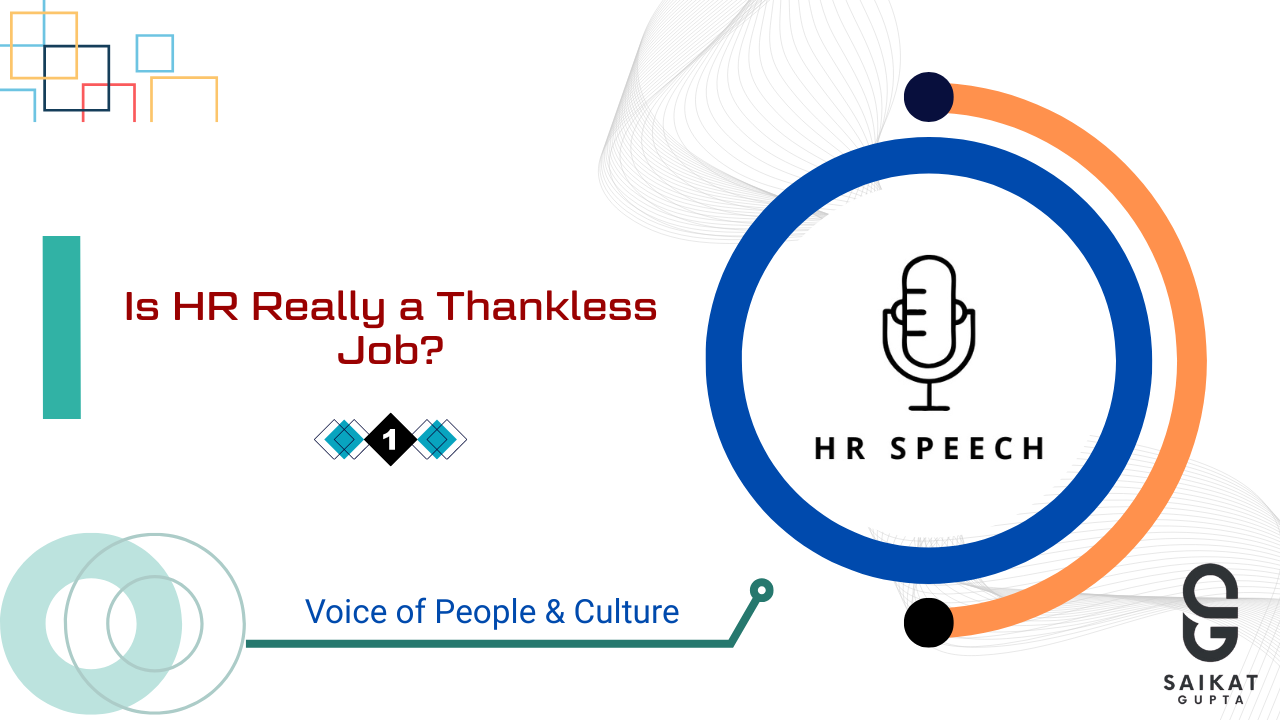
In every workplace, Human Resources (HR) serves as the backbone of people management from hiring, developing, supporting, and to parting ways with employees. Despite playing such a vital role, HR professionals often hear the same sentiment: “HR is a thankless job.” But is that entirely true? Let’s dive deep into this perception, its roots, and whether the tide is changing in today’s workplaces.
The Dual Identity of HR
HR has always been caught between two roles:
-
Employee Champion – ensuring employee well-being, addressing grievances, creating a positive work culture.
-
Management’s Guardian – enforcing policies, maintaining compliance, cutting costs, and at times executing unpopular decisions like layoffs.
This dual identity creates a paradox. Employees often feel HR represents management, while management expects HR to handle employees’ needs without friction. As a result, HR rarely receives appreciation from either side.
Why HR Is Seen as a Thankless Job
1. Invisible Contributions
When HR works efficiently in smooth onboarding, timely payroll, conflict resolution, employee engagement, people assume it’s “just routine.” Only when something goes wrong, such as delayed salaries or a compliance lapse, HR gets noticed (negatively).
2. Difficult Conversations
HR professionals are often the bearers of bad news:
-
Informing candidates they weren’t selected.
-
Delivering performance warnings.
-
Conducting terminations.
-
Enforcing unpopular policies
These are emotionally charged interactions where gratitude is rare, but resentment is common.
3. Perception vs. Reality
Employees may think HR’s work is “just paperwork” or “recruitment,” overlooking strategic tasks like workforce planning, talent development, succession planning, or shaping organizational culture. This lack of visibility reinforces the “thankless” tag.
4. Balancing the Unbalance
In conflicts between employees and management, HR is expected to remain neutral yet decisive. No matter what decision is taken, one party feels let down; leaving HR with little appreciation.
The Psychological Toll
The emotional labor of HR is immense. Dealing with people’s problems daily like burnouts, conflicts, workplace politics, harassment cases, or layoffs can create compassion fatigue. Unlike sales or marketing teams, HR doesn’t have quantifiable wins (like revenue or market share) to celebrate. The lack of visible “victories” makes recognition scarce.
Changing Dynamics: Is the Perception Evolving?
In the last decade, HR’s role has transformed from being administrative to strategic. Terms like People Experience, Employee Engagement, Talent Management, and Diversity & Inclusion reflect how organizations now recognize HR as a driver of business success.
-
Data-Driven HR: People analytics has helped HR prove ROI linking engagement initiatives to retention rates and productivity.
-
COVID-19 Pandemic: HR emerged as a frontline function, managing remote work, employee well-being, safety protocols, and digital transitions. Many organizations openly acknowledged HR’s pivotal role during the crisis.
-
Employee-Centric Workplaces: With the rise of employer branding and workplace culture as competitive differentiators, HR’s contributions are increasingly in the spotlight.
Stories of Gratitude That Do Exist
Though often unsaid, gratitude does exist for HR:
-
The employee whose career grew because of a well-designed training program.
-
The fresh graduate who remembers the HR manager’s encouragement during the first interview.
-
The team member who silently appreciates HR’s support during a personal crisis.
These moments rarely make headlines, but they are powerful reminders of HR’s impact.
How HR Can Reclaim Recognition
-
Communicate Value Transparently
Regularly share HR metrics such as attrition reduction, training hours, engagement scores to showcase tangible impact. -
Embrace a Strategic Partner Role
Move beyond transactional work to influencing business decisions, culture, and innovation. -
Humanize HR
Be approachable, empathetic, and visible. Small gestures like listening actively, being transparent in communication can change employee perceptions. -
Self-Recognition and Community
HR professionals should celebrate their wins within HR circles and communities, creating a sense of professional pride.
Final Thoughts
So, is HR really a thankless job? Yes and No.
Yes, because HR often operates in the background, solving problems silently and absorbing frustrations without applause. But no, because the impact HR makes is deeply significant even if not always acknowledged. HR is the custodian of culture, the architect of employee journeys, and the silent force that shapes organizational success.
In truth, HR is less “thankless” and more “quietly impactful.” Recognition may not always come in words, but it exists in the thriving teams, engaged employees, and successful organizations that HR helps build.
© DMCA Saikat Gupta 2025

No responses yet